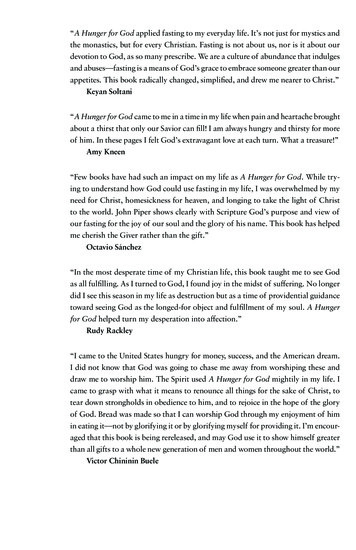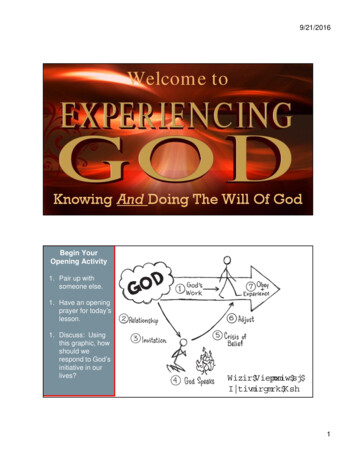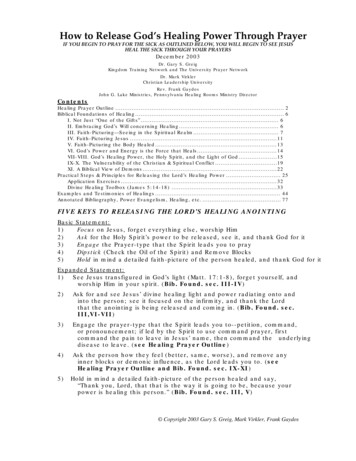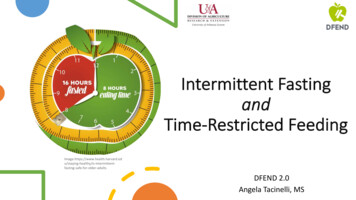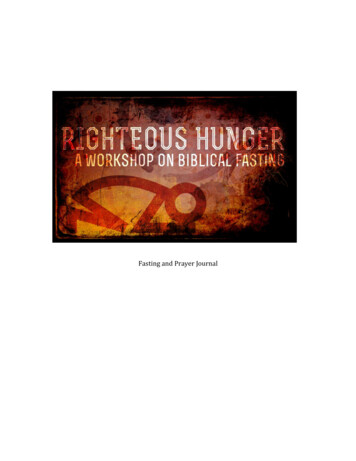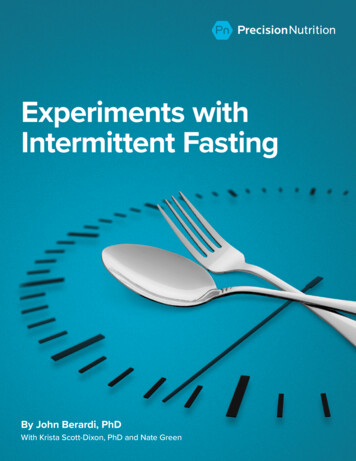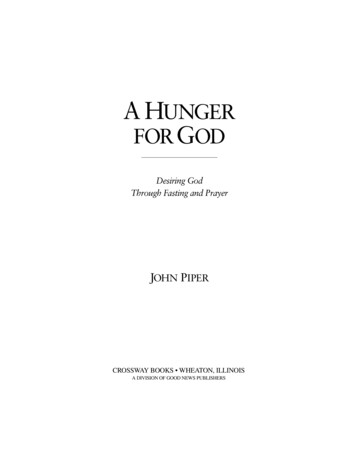
Transcription
A HUNGERFOR GODDesiring GodThrough Fasting and PrayerJOHN PIPERCROSSWAY BOOKS WHEATON, ILLINOISA DIVISION OF GOOD NEWS PUBLISHERS
A Hunger for GodCopyright 1997 by John PiperPublished by Crossway Booksa division of Good News Publishers1300 Crescent StreetWheaton, Illinois 60187All rights reserved. No part of this publication may be reproduced,stored in a retrieval system or transmitted in any form by anymeans, electronic, mechanical, photocopy, recording, or otherwise,without the prior permission of the publisher, except as provided byUSA copyright law.Cover photo: PhotoDiscCover design: D2 DesignWorksFirst printing, 1997Printed in the United States of AmericaUnless otherwise indicated, Bible quotations are taken from The NewAmerican Standard Bible, copyright 1960, 1962, 1963, 1968, 1971, 1972,1975, and 1977 by The Lockman Foundation, and are used by permission.Library of Congress Cataloging-in-Publication DataPiper, John, 1946A hunger for God : desiring God through fasting and prayer / JohnPiper.p.cm.Includes bibliographical references and index.ISBN 0-89107-966-11. Fasting. 2. Prayer—Christianity. 3. Desire for God.I. Title.BV5055.P57 1997248.4'7—dc2197-15577061505140413120311021001
To my fellow eldersof Bethlehem Baptist Church,who hunger with mefor the fullness of God,and feast with meat the table of grace.
CONTENTS1 Preface91 Introduction: A Homesickness for God131 IS FASTING CHRISTIAN?25New Fasting for the New Wine2 MAN SHALL NOT LIVE BY BREAD ALONE51The Desert Feast of Fasting3 FASTINGFOR THE REWARD OF THE FATHER67Jesus’ Radical God-Orientation in Fasting4 FASTING FOR THE KING’S COMINGHow Much Do We Miss Him?835 FASTING99AND THE COURSE OF HISTORYA Call for Discernment and Desire6 FINDING GODIN THE GARDEN OF PAIN125A Different Fast for the Sake of the Poor7 FASTINGFOR THE LITTLE ONES155Abortion and the Sovereignty of God Over False Worldviews8 Conclusion: Why Does God Reward Fasting?175Appendix: Quotes and Experiences183Bibliography211Notes215Note on Resources: Desiring God Ministries225
Scripture Index227Person Index233Subject Index237
PREFACEBeware of books on fasting. The Bible is very careful to warn usabout people who “advocate abstaining from foods, which Godcreated to be gratefully shared in by those who believe and knowthe truth” (1 Timothy 4:1-3). The apostle Paul asks with dismay,“Why . . . do you submit yourself to decrees, such as ‘Do not handle, do not taste, do not touch’?” (Colossians 2:20-21). He isjealous for the full enjoyment of Christian liberty. Like a greatdeclaration of freedom over every book on fasting flies the banner, “Food will not commend us to God; we are neither the worseif we do not eat, nor the better if we do eat” (1 Corinthians 8:8).There once were two men. One said, “I fast twice a week”; theother said, “God be merciful to me a sinner.” Only one wentdown to his house justified (Luke 18:12-14).The discipline of self-denial is fraught with dangers—perhaps only surpassed by the dangers of indulgence. These alsowe are warned about: “All things are lawful for me, but I will notbe mastered by anything” (1 Corinthians 6:12). What masters ushas become our god; and Paul warns us about those “whose god
10A HUNGER FOR GODis their appetite” (Philippians 3:19). Appetite dictates the direction of their lives. The stomach is sovereign. This has a religiousexpression and an irreligious one. Religiously “persons . . . turnthe grace of our God into licentiousness” (Jude 4) and tout theslogan, “Food is for the stomach and the stomach is for food”(1 Corinthians 6:13). Irreligiously, with no pretext of pardoninggrace, persons simply yield to “the desires for other things [that]enter in and choke the word” (Mark 4:19).“Desires for other things”—there’s the enemy. And the onlyweapon that will triumph is a deeper hunger for God. The weakness of our hunger for God is not because he is unsavory, butbecause we keep ourselves stuffed with “other things.” Perhaps,then, the denial of our stomach’s appetite for food might express,or even increase, our soul’s appetite for God.What is at stake here is not just the good of our souls, butalso the glory of God. God is most glorified in us when we aremost satisfied in him. The fight of faith is a fight to feast on all thatGod is for us in Christ. What we hunger for most, we worship.His goodness shines with brightest raysWhen we delight in all his ways.His glory overflows its rimWhen we are satisfied in him.His radiance will fill the earthWhen people revel in his worth.The beauty of God’s holy fireBurns brightest in the heart’s desire.Between the dangers of self-denial and self-indulgence thereis a path of pleasant pain. It is not the pathological pleasure of amasochist, but the passion of a lover’s quest: “I have suffered theloss of all things, and count them but rubbish in order that I maygain Christ” (Philippians 3:8). That is the path we will try to follow in this book.
PREFACE11That I could even attempt the journey is owing to God’sgrace, which I live on every day. It has come to me in Jesus wholoved me and gave himself for me. It has come to me in my wife,Noël, who supports me in the work of preaching and writing andtending the flock. I love you, Noël, and thank you for your partnership in the great work. God has been good to us. Grace hascome to me again in the faithful labors of Carol Steinbach, whosecareful reading has left its mark, and whose industry created theindexes. And grace has come to me through my fellow elders atBethlehem Baptist Church. They forged a mission statement forour church that I embrace as the mission of my life. And theygave me the charge and the time to write this book and make ita part of that mission: “We exist to spread a passion for thesupremacy of God in all things for the joy of all peoples.” Thatis my prayer for this book. When God is the supreme hunger ofour hearts, he will be supreme in everything.John PiperMay 1, 1997
Whom have I in heaven but thee?And there is nothing upon earththat I desire besides thee.My flesh and my heart may fail,but God is the strength of my heartand my portion for ever.—PSALM 73:25-26, RSVAlmost everywhere at all times fasting has held a placeof great importance since it is closely linked with theintimate sense of religion. Perhaps this is the explanation for the demise of fasting in our day. When thesense of God diminishes, fasting disappears.—EDWARD FARRELL1
INTRODUCTIONA Homesicknessfor GodThe birthplace of Christian fasting is homesickness for God. Inthe summer of 1967 I had been in love with Noël for a wholeyear. If you had told me then that we would have to wait anotheryear and a half to marry, I would have protested firmly. For us,it seemed, the sooner the better. It was the summer before mysenior year in college. I was working as a water safety instructorat a Christian athletic camp in South Carolina. She was hundredsof miles away working as a waitress.Never had I known an aching like this one. I had been homesick before, but never like this. Every day I would write her a letter and talk about this longing. In the late morning, just beforelunch, there would be mail call. When I heard my name and sawthe lavender envelope, my appetite would be taken away. Or, moreaccurately, my hunger for food was silenced by the hunger of myheart. Often, instead of eating lunch with the campers, I wouldtake the letter to a quiet place in the woods and sit down on theleaves for a different kind of meal. It wasn’t the real thing. But thecolor, the smell, the script, the message, the signature were fore-
14A HUNGER FOR GODtastes. And with them, week by week, I was strengthened in hope,and the reality just over the horizon was kept alive in my heart.The Romance and the Resistance of FastingChristian fasting, at its root, is the hunger of a homesickness forGod. But the story of my heart-hunger to be with Noël could bemisleading. It tells only half the story of Christian fasting. Halfof Christian fasting is that our physical appetite is lost becauseour homesickness for God is so intense. The other half is that ourhomesickness for God is threatened because our physicalappetites are so intense. In the first half, appetite is lost. In the second half, appetite is resisted. In the first, we yield to the higherhunger that is. In the second, we fight for the higher hunger thatisn’t. Christian fasting is not only the spontaneous effect of asuperior satisfaction in God; it is also a chosen weapon againstevery force in the world that would take that satisfaction away.God’s Greatest Adversaries Are His GiftsThe greatest enemy of hunger for God is not poison but apple pie.It is not the banquet of the wicked that dulls our appetite forheaven, but endless nibbling at the table of the world. It is notthe X-rated video, but the prime-time dribble of triviality wedrink in every night. For all the ill that Satan can do, when Goddescribes what keeps us from the banquet table of his love, it isa piece of land, a yoke of oxen, and a wife (Luke 14:18-20). Thegreatest adversary of love to God is not his enemies but his gifts.And the most deadly appetites are not for the poison of evil, butfor the simple pleasures of earth. For when these replace anappetite for God himself, the idolatry is scarcely recognizable,and almost incurable.Jesus said some people hear the word of God, and a desire
INTRODUCTION15for God is awakened in their hearts. But then, “as they go on theirway they are choked with worries and riches and pleasures of thislife” (Luke 8:14). In another place he said, “The desires for otherthings enter in and choke the word, and it becomes unfruitful”(Mark 4:19). “The pleasures of this life” and “the desires forother things”—these are not evil in themselves. These are notvices. These are gifts of God. They are your basic meat and potatoes and coffee and gardening and reading and decorating andtraveling and investing and TV-watching and Internet-surfingand shopping and exercising and collecting and talking. And allof them can become deadly substitutes for God.The Deadening Effects of Innocent DelightsTherefore, when I say that the root of Christian fasting is thehunger of homesickness for God, I mean that we will do anythingand go without anything if, by any means, we might protect ourselves from the deadening effects of innocent delights and preserve the sweet longings of our homesickness for God. Not justfood, but anything. Several years ago I called our people to fastfor a twenty-four-hour period once a week (breakfast and lunchon Wednesdays, if possible) during the month of January. Wewere facing huge issues of self-assessment and direction, and weneeded the fullness of God’s presence with all his wisdom andpurifying power. Within a few days I got this note in the mail:I’m behind this. I think God is in it. It doesn’t work for meon Wednesday. I’m with people over lunch every day. So Ihave a couple of things I believe are from the Spirit that maybe more of a fast for some than food. I thought not watching television for a week, or for a month, or a night of theweek when I normally watch it, might be more of a fast thanfood. Instead of watching my favorite program, I might
16A HUNGER FOR GODspend the time talking and listening to God. I wonder if theremight be others for whom this would be a fast and wouldbe a focused time of prayer to them.I said to the congregation the next Sunday, “Amen. If yousay, ‘Fasting on Wednesday doesn’t work for me,’ that’s okay. Ifyour heart is right and you’re open to the Lord and you’re asking him, ‘Lord, draw me into the spirit of awakening throughfasting,’ he will show you. He’ll show you when and how. If yourhealth doesn’t allow for that, if the doctor says, ‘No fasting foryou,’ that’s fine. The Great Physician knows all about that, andsomething else will work for you.”The issue is not food per se. The issue is anything and everything that is, or can be, a substitute for God. Martyn Lloyd-Jones(1899-1981), the pastor of Westminster Chapel in London, delivered a great sermon on fasting when he was preaching throughthe Sermon on the Mount in 1959-1960. In it he said,Fasting if we conceive of it truly, must not . . . be confinedto the question of food and drink; fasting should really bemade to include abstinence from anything which is legitimate in and of itself for the sake of some special spiritualpurpose. There are many bodily functions which are rightand normal and perfectly legitimate, but which for specialpeculiar reasons in certain circumstances should be controlled. That is fasting.2My assumption so far has been that good things can dogreat damage. Oxen and fields and marriage can keep you out ofthe kingdom of heaven. Which is why Jesus says, “No one of youcan be my disciple who does not bid farewell to all his own possessions” (Luke 14:33, author’s translation3). Anything can standin the way of true discipleship—not just evil, and not just food,but anything. Nor should it be surprising that the greatest com-
INTRODUCTION17petitors for our devotion and affection for God would be someof his most precious gifts.When Abraham Preferred God to the Life of His SonHow does fasting help us keep from turning gifts into gods?Consider the almost-sacrifice of Isaac by his father Abraham.When Abraham had stretched out his hand to kill his son and theheir of God’s promise, “the angel of the LORD called to him fromheaven, and said, ‘Abraham, Abraham!’ And he said, ‘Here I am.’And he said, ‘Do not stretch out your hand against the lad, anddo nothing to him; for now I know that you fear God, since youhave not withheld your son, your only son, from Me’” (Genesis22:11-12). Now here was a radical kind of fast: the sacrifice of ason. God did not call for this “fast” because Isaac was evil. Onthe contrary, it was because in Abraham’s eyes he was so good.Indeed he seemed indispensable for the fulfillment of God’spromise. Fasting is not the forfeit of evil but of good.But why would God call for such a thing? Because it was atest. Does Abraham delight in the fear of the Lord (Isaiah 11:3)more than he delights in his own son? God spoke through theangel: “Now I know that you fear God, since you have not withheld your son, your only son, from Me.” These words, “now Iknow”—what do they mean? Did God not know that Abrahamwas a God-fearing man and that he valued God above his son?The Bible teaches that God “knows the hearts of all men”(1 Kings 8:39; Acts 1:24); indeed, he “fashions the hearts of themall” (Psalm 33:15). Why then the test? Here is the way C. S. Lewisanswers the question,[I am concerned with the question] “If God is omniscient hemust have known what Abraham would do, without anyexperiment; why, then, this needless torture?” But as St.
18A HUNGER FOR GODAugustine points out, whatever God knew, Abraham at anyrate did not know that this obedience would endure such acommand until the event taught him; and the obediencewhich he did not know that he would choose, he cannot besaid to have chosen. The reality of Abraham’s obedience wasthe act itself; and what God knew in knowing that Abraham“would obey” was Abraham’s actual obedience on thatmountain top at that moment. To say that God “need nothave tried the experiment” is to say that because Godknows, the thing known by God need not exist.4God wills to know the actual, lived-out reality of our preference for him over all things. And he wills that we have the testimony of our own authenticity through acts of actual preferenceof God over his gifts. Lewis is right that God may as well not havecreated the world, but only imagined it, if his knowing what“would be” is as good as his knowing it in the very act. God willsthat he have an experiential-knowing, an actual seeing-knowing,a watching-knowing. A real lived-out human act of preferencefor God over his gifts is the actual lived-out glorification of God’sexcellence for which he created the world. Fasting is not the onlyway, or the main way, that we glorify God in preferring himabove his gifts. But it is one way. And it is a way that can serveall the others.Eating as the Anesthesia of SadnessLewis referred to St. Augustine. What Augustine said was this:“For the most part, the human mind cannot attain to self-knowledge otherwise than by making trial of its powers through temptation, by some kind of experimental and not merely verbalself-interrogation.”5 In other words, we easily deceive ourselvesthat we love God unless our love is frequently put to the test, andwe must show our preferences not merely with words but with
INTRODUCTION19sacrifice. Admittedly the sacrifice of a son says more than the sacrifice of a sandwich. But the principle is the same. And manysmall acts of preferring fellowship with God above food can forma habit of communion and contentment that makes one ready forthe ultimate sacrifice. This is one way that fasting serves all ouracts of love to God. It keeps the preferring faculty on alert andsharp. It does not let the issue rest. It forces us to ask repeatedly:do I really hunger for God? Do I miss him? Do I long for him?Or have I begun to be content with his gifts?Christian fasting is a test to see what desires control us.What are our bottom-line passions? In his chapter on fasting inThe Celebration of Discipline, Richard Foster says, “More thanany other discipline, fasting reveals the things that control us.This is a wonderful benefit to the true disciple who longs to betransformed into the image of Jesus Christ. We cover up what isinside of us with food and other things.”6Psychologically, that sort of thing is spoken of a lot today,especially in regard to people who have much pain in their lives.We would say they “medicate” their pain with food. They anesthetize themselves to the hurt inside by eating. But this is not somerare, technical syndrome. All of us do it. Everybody. No exceptions. We all ease our discomfort using food and cover our unhappiness by setting our eyes on dinnertime. Which is why fastingexposes all of us—our pain, our pride, our anger. Foster continues:If pride controls us, it will be revealed almost immediately.David said, “I humbled my soul with fasting” [Psalm 35:13].Anger, bitterness, jealousy, strife, fear—if they are within us,they will surface during fasting. At first, we will rationalizethat our anger is due to our hunger. And then, we know thatwe are angry because the spirit of anger is within us. We canrejoice in this knowledge because we know that healing isavailable through the power of Christ.7
20A HUNGER FOR GODOne of the reasons for fasting is to know what is in us—justas Abraham showed what was in him. In fasting it will come out.You will see it. And you will have to deal with it or quicklysmother it again. When midmorning comes and you want foodso badly that the thought of lunch becomes as sweet as a summer vacation, then suddenly you realize, “Oh, I forgot, I made acommitment. I can’t have that pleasure. I’m fasting for lunchtoo.” Then what are you going to do with all the unhappinessinside? Formerly, you blocked it out with the hope of a tastylunch. The hope of food gave you the good feelings to balanceout the bad feelings. But now the balance is off. You must findanother way to deal with it.The Hungry Handmaid of FaithAt these points we really begin to discover what our spiritualresources are. The things I discover about my soul are so valuable for the fight of faith. I almost subtitled this book: Fasting—the Hungry Handmaid of Faith. What a servant she is! Humblyand quietly, with scarcely a movement, she brings up out of thedark places of my soul the dissatisfactions in relationships, thefrustrations of the ministry, the fears of failure, the emptiness ofwasted time. And just when my heart begins to retreat to the delicious hope of eating supper with friends at Pizza Hut, she quietlyreminds me: not tonight. It can be a devastating experience atfirst. Will I find spiritual communion with God sweet enough,and hope in his promises deep enough, not just to cope, but toflourish and rejoice in him? Or will I rationalize away my needto fast and retreat to the medication of food? The apostle Paulsaid, “I will not be mastered by anything” (1 Corinthians 6:12).Fasting reveals the measure of food’s mastery over us—or television or computers or whatever we submit to again and again toconceal the weakness of our hunger for God.
INTRODUCTION21Why Did God Create Bread and Hunger?One of the reasons food has this amazing power is that it is sobasic to our existence. Why is this? I mean, why did God createbread and design human beings to need it for life? He could havecreated life that has no need of food. He is God. He could havedone it any way he pleased. Why bread? And why hunger andthirst? My answer is very simple: He created bread so that wewould have some idea of what the Son of God is like when hesays, “I am the bread of life” (John 6:35). And he created therhythm of thirst and satisfaction so that we would have someidea of what faith in Christ is like when Jesus said, “He whobelieves in me shall never thirst” (John 6:35). God did not haveto create beings who need food and water and who have capacities for pleasant tastes.But man is not the center of the universe, God is. And everything, as Paul says, is “from him and through him and to him”(Romans 11:36). “To him” means everything exists to call attention to him and to bring admiration to him. In Colossians 1:16,Paul says more specifically that “all things were created by[Christ] and for [Christ].” Therefore bread was created for theglory of Christ. Hunger and thirst were created for the glory ofChrist. And fasting was created for the glory of Christ.Which means that bread magnifies Christ in two ways: bybeing eaten with gratitude for his goodness, and by being forfeited out of hunger for God himself. When we eat, we taste theemblem of our heavenly food—the Bread of Life. And when wefast we say, “I love the Reality above the emblem.” In the heartof the saint both eating and fasting are worship. Both magnifyChrist. Both send the heart—grateful and yearning—to the Giver.Each has its appointed place, and each has its danger. The danger of eating is that we fall in love with the gift; the danger of fasting is that we belittle the gift and glory in our willpower.
22A HUNGER FOR GODHow the Book Is OrganizedThere is no safe and easy way home to heaven. The hard and narrow way is strewn with obstacles and many fatal paths of innocent pleasure. There is a war to be fought within and without.And one of the weapons along the way is fasting. Therefore thisbook has an inward and an outward thrust. It’s about the inwardwar with our own appetites that compete with hunger for God.And it’s about the outward war of revival and reformation andworld evangelization and social justice and cultural engagement.Though they are deeply interwoven, the first three chapters aremore inward, and the last three are more outward. And the onein the middle is a crossover chapter because longing and fastingfor the coming of Christ is intensely personal but demands globalengagement until he comes.Why I Wrote This BookMy aim and my prayer in writing this book is that it might awakena hunger for the supremacy of God in all things for the joy of allpeoples. Fasting proves the presence, and fans the flame, of thathunger. It is an intensifier of spiritual desire. It is a faithful enemyof fatal bondage to innocent things. It is the physical exclamationpoint at the end of the sentence: “This much, O God, I long foryou and for the manifestation of your glory in the world!”One might think that those who feast most often on communion with God are least hungry. They turn often from theinnocent pleasures of the world to linger more directly in the presence of God through the revelation of his Word. And there theyeat the Bread of Heaven and drink the Living Water by meditation and faith. But, paradoxically, it is not so that they are theleast hungry saints. The opposite is the case. The strongest, mostmature Christians I have ever met are the hungriest for God. It
INTRODUCTION23might seem that those who eat most would be least hungry. Butthat’s not the way it works with an inexhaustible fountain, andan infinite feast, and a glorious Lord.When you take your stand on the finished work of God inChrist, and begin to drink at the River of Life and eat the Breadof Heaven, and know that you have found the end of all yourlongings, you only get hungrier for God. The more satisfactionyou experience from God, while still in this world, the greateryour desire for the next. For, as C. S. Lewis said, “Our best havings are wantings.”8The more deeply you walk with Christ, the hungrier you getfor Christ . . . the more homesick you get for heaven . . . the moreyou want “all the fullness of God” . . . the more you want to bedone with sin . . . the more you want the Bridegroom to comeagain . . . the more you want the Church revived and purifiedwith the beauty of Jesus . . . the more you want a great awakening to God’s reality in the cities . . . the more you want to see thelight of the gospel of the glory of Christ penetrate the darknessof all the unreached peoples of the world . . . the more you wantto see false worldviews yield to the force of Truth . . . the moreyou want to see pain relieved and tears wiped away and deathdestroyed . . . the more you long for every wrong to be made rightand the justice and grace of God to fill the earth like the waterscover the sea.If you don’t feel strong desires for the manifestation of theglory of God, it is not because you have drunk deeply and aresatisfied. It is because you have nibbled so long at the table ofthe world. Your soul is stuffed with small things, and there isno room for the great.9 God did not create you for this. Thereis an appetite for God. And it can be awakened. I invite you toturn from the dulling effects of food and the dangers of idolatry, and to say with some simple fast: “This much, O God, Iwant you.”
But the days will comewhen the bridegroomis taken away from them,and then they will fast.—MATTHEW 9:15If you have died with Christto the elementary principles of the world,why, as if you were living in the world,do you submit yourself to decrees, such as,“Do not handle, do not taste, do not touch!”(which all refer to things destined to perish with the using)—in accordance with the commandmentsand teachings of men?These are matters which have, to be sure,the appearance of wisdomin self-made religion and self-abasementand severe treatment of the body,but are of no value against fleshly indulgence.—COLOSSIANS 2:20-23
1IS FASTINGCHRISTIAN?New Fasting forthe New WineThere’s a little document called the Didache which was writtennear the end of the first century. In it there is a section on fasting.One verse goes like this: “Let not your fasts be with hypocrites,for they fast on Mondays and Thursdays, but do you fast onWednesdays and Fridays.”1 Now that seems strange. Why ischanging the fast days such a big deal? I think the point of theearly church was this: the Jewish custom was to celebrate itsSabbath on Saturday. That’s what the Old Covenant called for.Now, to show that we have continuity and discontinuity fromJudaism, we Christians will celebrate the Sabbath, but on a different day. We will celebrate on Sunday, the day the Lord rosefrom the dead and created a new people. In the same way theJews did their fasting on Mondays and Thursdays, but we willdo ours on different days. Why? Same reason: to show there iscontinuity and discontinuity. Yes, we embrace fasting; but, no,not just as we find it. There is something new about Christianfasting. We’ll take it, but we’ll change it. No, we don’t mean thatfasting on different days is what makes it Christian. That is only
26A HUNGER FOR GODa pointer. But Christian fasting is new. That is for sure. How it isnew is the point of this chapter.In this connection, the most important word on fasting inthe Bible is Matthew 9:14-17.2 I know this is a sweeping claimfor me to make. But I say it because these words of Jesus speakmost directly and deeply to the central problem of fasting—namely, Is it a distinctively Christian thing to do? If so, how?It Is Not Obvious That Fasting Is ChristianThis is a crucial question for at least four reasons. First of all,fasting, as a deliberate abstinence from food for religious, cultural, political, or health reasons, is “a practice found in all societies, cultures and centuries.”3 Virtually every religion in theworld practices fasting. And even non-religious people fast forpolitical and health reasons. So why should Christians join thispagan parade of asceticism? Second, even if fasting was practiced extensively by God’s people in the Old Testament, does notthe arrival of the kingdom in the ministry of Jesus make thispractice obsolete? Can you put the new wine of the kingdominto the old wineskins of external form and ritual? Third, doesnot the finished triumph of Christ on the cross, and the ongoingpresence of the Holy Spirit in the church mean that the victorious Christ is so powerfully among us that the dominant spiritof life should be celebration, not mortification? And besidesthese three objections, does not the triumph of fasting over thebody’s appetites lead to pride and self-reliance, which is evenworse than gluttony?So it is not at all obvious that fasting is a distinctivelyChristian thing to do. If it is, we need to see how it relates to theCenter. And the Center is the triumph of Christ in dying and rising and reigning over history for the salvation of his people andthe glory of his Father.
IS FASTING CHRISTIAN?27Fasting Is a Universal Religious PracticeNo one knows how or where fasting had its beginning.4Wherever you go, there are customs and traditions of fasting.Most people are aware of the Jewish fasts including Yom Kippur,o
A hunger for God : desiring God through fasting and prayer / John Piper. p. cm. Includes bibliographical references and index. ISBN 0-89107-966-1 1. Fasting. 2. Prayer—Christianity. 3. Desire for God. I. Title. BV5055.P57 1997
